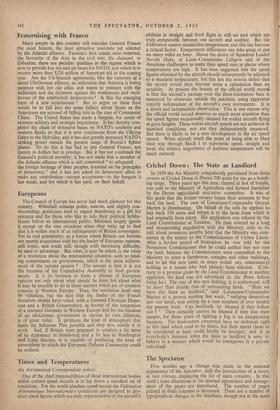Fraternising with Franco
Many people in this country will consider General Franco ithe most bizarre, the least attractive associate yet selected by the Atlantic alliance. Fascism's first cousin once removed, the favourite of the Axis in the civil war, the claimant to Gibraltar, these are peculiar qualities in the regime which is now to provide key sea and air-bases for NATO, and which is to receive more than $226 million of American aid in the coming year. Are the US-Spanish agreements, like the rumours of a direct US-German alliance, an indication that America is losing patience with her old allies and wants to reinsure with the militarists and the dictators against the weaknesses and vacil- lations of the established democracies? Is this the emerging form of a new isolationism ? But to argue on these lines would be to fall into the same fallacy about Spain as the Americans are accused of falling into in the case of Communist China. The United States has made a bargain, for assets of extreme military and strategic importance. It has thereby com- pleted the chain of defensive bases on NATO's southern and western flanks so that it is now continuous from the Cilician Gates to the Hebrides; and it has also greatly increased NATO's striking power outside the present range of Russia's fighter 'planes. To do this it has had to pay General Franco, not 'merely in dollars but in prestige. But it has not condoned the General's political morality; it has not made him a member of the Atlantic alliance which is still committed " to safeguard . . . the foreign heritage of their peoples. founded on the principles of democracy " and it has not asked its democratic allies to make any contribution—except acceptance—to the bargain it has made, and for which it has paid, on their behalf.


















































 Previous page
Previous page